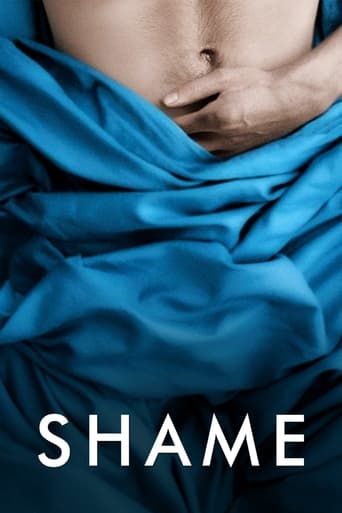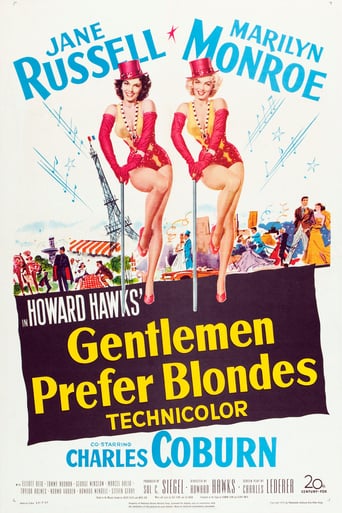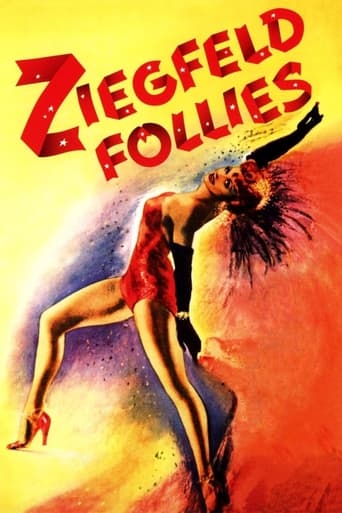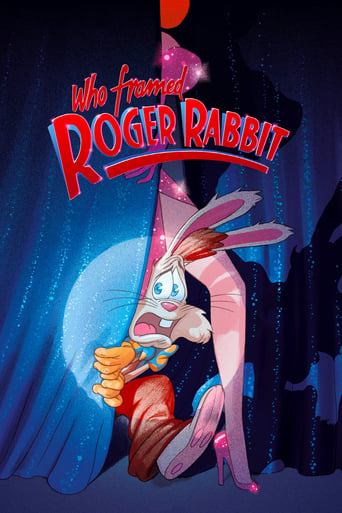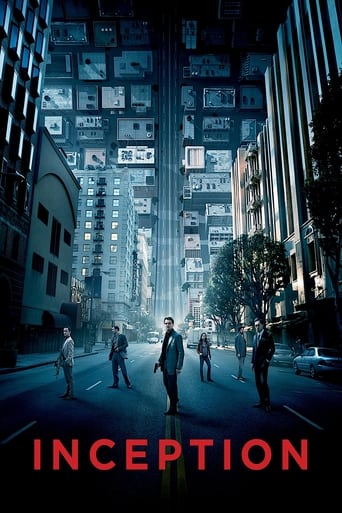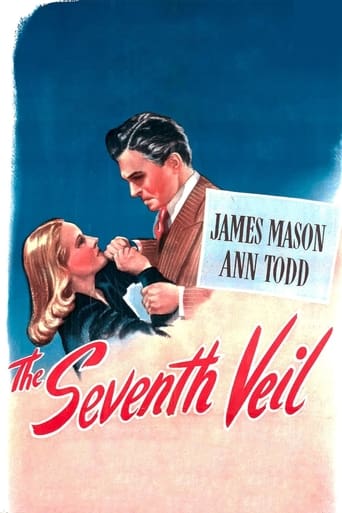


The Seventh Veil
A concert pianist with amnesia fights to regain her memory.
-
- Cast:
- James Mason , Ann Todd , Herbert Lom , Hugh McDermott , Albert Lieven , Yvonne Owen , David Horne


Similar titles
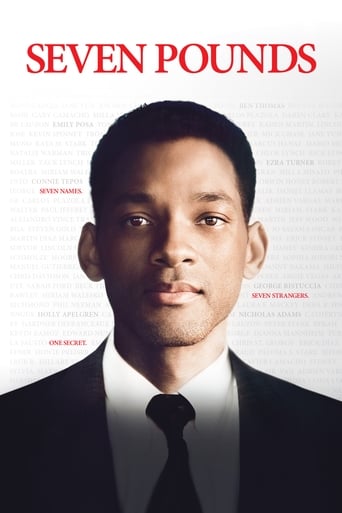
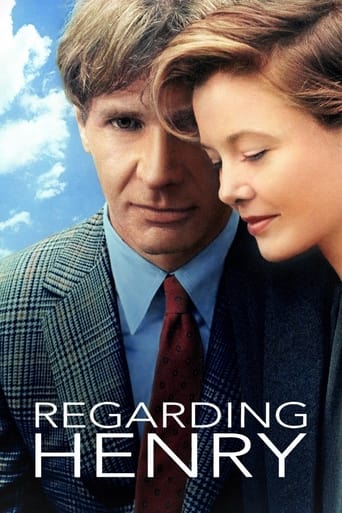
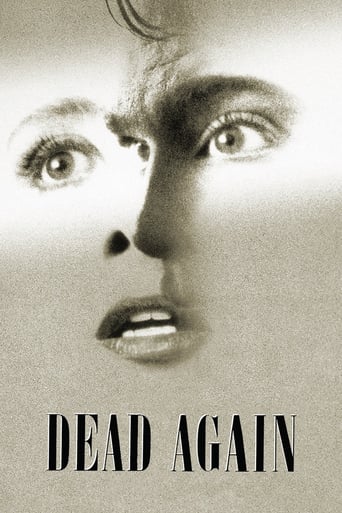



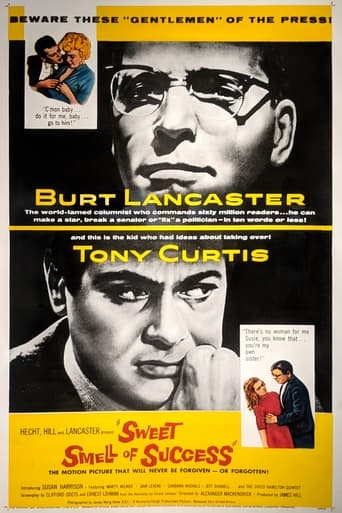
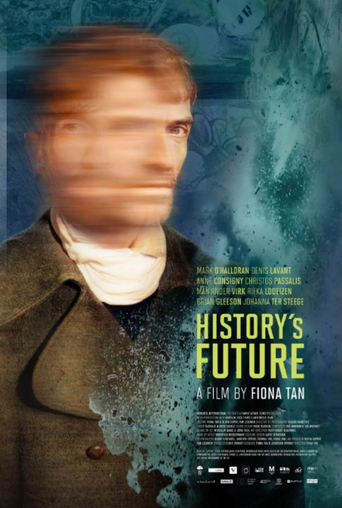
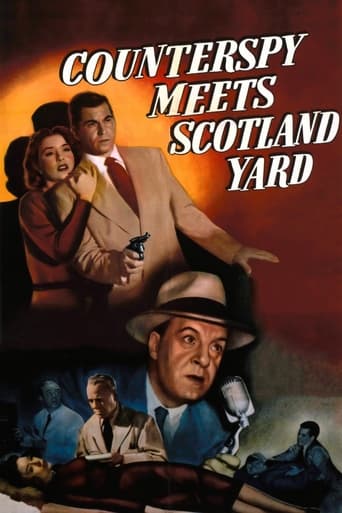
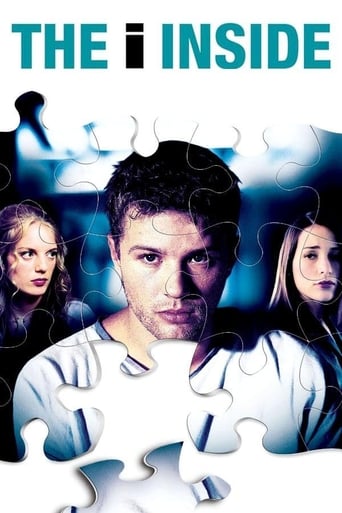
Reviews
I like the storyline of this show,it attract me so much
You won't be disappointed!
Fresh and Exciting
It's the kind of movie you'll want to see a second time with someone who hasn't seen it yet, to remember what it was like to watch it for the first time.
If ever a film defined Terence Rattigan's assertion that the 'English Disease' is repression then this is it. Here we have two not one leading players both repressed to the nth degree. It's fluff and nonsense of course but amazingly entertaining with it. James Mason could almost have written the part of Nicholas himself. There are, of course, the odd hiccups; why, for example, if she is bent on suicide, does Todd's Francesca, take the trouble to waste several minutes eluding hospital staff and then make her way to a river/canal instead of just opening a vein in situ. This cavil apart we are left with a very 'period' melodrama which still holds up if you're prepared to meet it half way.
Seven veils ago, I saw this film, and here it is again, all wrapped up in its mystery once more. The lead performances by Ann Todd and James Mason are so good that the whole film sweeps you away with its rather implausible story. No wonder it got an Oscar for best original screenplay by the Two Boxes (Muriel and Sydney Box, a famous cinematic couple, Sydney also being the producer of this film), and is one of the ten most popular British films of all time, according to a survey. This film also launched Herbert Lom's career onto a higher level, because he was so reassuring and calm as the hypno-therapist who treats Ann Todd that everyone wanted to run to him with their troubles, or at least see more of him on the screen, which was almost as good. Once again, we see the Scottish actor Hugh McDermott (1906-1972) playing an American, which he did so often everybody thought he really was one. (Of course, it is anatomically impossible for a Scot to be an American, as everybody knows, unless they have their kilts surgically removed at birth, that is.) Muir Mathieson not only conducts the orchestra (the London Symphony Orchestra) but is actually seen to conduct the orchestra, for this is a film about a musician, namely Ann Todd herself, a tormented concert pianist who has lots of veils smothering her oppressed psyche and who is worried about her hands ever since a sadistic headmistress caned them at school just before a music exam, causing her to fail it and miss a music scholarship. And as one sensationalist poster advertising this film in 1945 stated: 'It dares to strip bare a woman's mind.' Well, that is a terrifying thought to us men, for what might we find there? And surely it is impolite to remove veil after veil like that, ending up with the seventh and last, beneath which we will at last understand her, not to mention what we might see. You know what we men are like about wanting to lift veils and have a peek. When I was four, I used to peek under the skirt of a girl at school named Rita to see what colour knickers she was wearing, as she changed colours every day. I would then shout out to the class: 'They're blue today!' or 'They're pink today!' What fun. It was also such fun to tease her, as she was rather stuck on herself and was always flouncing around self-importantly. But this film is in black and white, so we can't tell what colour knickers anybody at all is wearing. And in any case, in 1945, there were no scenes which showed them anyway. Sydney Box in 1957 produced an amusing film entitled THE TRUTH ABOUT WOMEN, with Larry Harvey. So you see, Box spent years trying to understand them, and even with all the help his wife could give him, I wonder if he ever succeeded. Most of us chaps are still exploring this mysterious subject, except for the ones who bat for the other side, of course, to whom women are objects of indifference, which is such a pity and such a waste of pulchritude. ('Pulchritude' was Charlie Chaplin's favourite euphemistic word, a nod in the direction of gentility. Look it up.) This film is very much a melodrama in the high style. Ann Todd is left an orphan in her teens and her only living relative is James Mason, a second cousin. He reluctantly takes her in, but has an inveterate hatred of women. He is continually looking accusingly at the oil portrait of his deceased mother, which hangs over the mantel of the drawing room, so that gives us a clue. He is extremely rich and lives in a kind of small palace in London. He walks with a pronounced limp, aided by a stick. He barely speaks to Todd, having contempt for her because she is female. He often disappears for weeks on end without explanation, and he turns up late at night in top hat and tails, having been at Pratt's perhaps, and God knows what opera before that, on his own of course, as he is a solitary figure. All the servants in the house are men. If it were not 1945, when no such thing existed, we might even suspect him of being gay. But his attitude towards Todd changes entirely when he discovers that she can play the piano excellently well. For he is a classical music fanatic. He plays, but not well enough. It occurs to him that he can realize his passion for the piano by nurturing the genius of his ward, so he spares no trouble, sends her to the Royal College of Music (some scenes are shot there, and Ann Todd spent three months there preparing to play her role), and is always by her side for the five hours a day that she practices, obsessively promoting her career. She becomes a famous pianist, plays Rachmaninoff concerti and so forth in flowing dresses. Ann Todd herself could play the piano, and there are many scenes where she is really doing it, which are most impressive. For the final sound track, however, Eileen Joyce recorded the pieces. She is the same person who played all that Rachmaninoff on the sound track of David Lean's BRIEF ENCOUNTER of this same year. This is essentially a psychological melodrama, so the psyches of Mason and Todd are the centre of our concern. They are both deeply disturbed people. And what will come of all this? Especially when men start to enter Ann Todd's life? Mason takes that very badly. The rules of IMDb reviewing forbid discussion of the ending, so it is not possible to go into what happens when the seventh veil is lifted by the determined Herbert Lom, with his relentless hypnotherapy sessions. But it is certainly all very dramatic indeed.
This is a true classic. If you can appreciate a film as a work of art, regardless of whether it represents the genre you like, then this will be in your list of great movies. Like all movies about relationships between men and woman, it will be open season for the kooks trying to work off their own personal problems, but take it at its face value. Ignore the political correctness parasites and appreciate the movie.James Mason's portrayal of a man who was hiding from the world but eventually found something to bring him back into it - a flawed but selfless love - is a work of genius. Ann Todd is excellent also, as the young girl who becomes a famous pianist under his direction. Herbert Lom, playing the character role of a psychiatrist, is brilliant.It is a melodrama, but very, very well done, with great acting.
THE SEVENTH VEIL is a dear film favourite of mine. I find the film semi-addictive, very enjoyable and strangely hypnotic, even haunting. This surprise little hit of 1945 (made on a small budget)did wonders at the box office and picked up an Oscar.I won't summarise the plot here, but I will offer an interesting discussion on the film for those who like to enjoy yet also ponder the meaning behind THE SEVENTH VEIL....It's a film that attracts a lot of divisive opinion. To many, it's enjoyable romantic kitsch- harmless fun. Some (my mother would fall into this category)find it mildly disturbing that our heroine, the lovely, brilliant yet tortured concert pianist Francesa (Ann Todd), runs straight into the arms of the guardian, Nicholas (an excellent James Mason in his best early role) who cut her off from having a normal life and also attempted to smash her fingers with his ever-present (some Freudian fun?) cane. Others call it a fine little film, a classic even. Still others (critic Pauline Kael) refer to it as a "sadomasochist's sundae", and point out that Nicholas and Francesca are clearly going to need years of "couples counselling" to achieve a normal, functioning relationship.One of the main criticisms levelled at it is it's now-dated psychiatry theme. However, the theme pleasingly does not meander in too much psychobabble (unlike the same year's SPELLBOUND), and Herbert Lom, in a role that is now cliché, is very good indeed. I like the flashback structure (again, now a standard cliché of the Hollywood film)and I think it, along with the Freudian overtones, would have seemed fresh in the 1940's.Other criticisms that seem to frequently appear are the casting of Ann Todd and her appearance as fourteen year old girl in school dress. Some ask why the did not simply get a teen actress who resembles Todd to play Francesca as a girl? Budget constraints have often been cited as a reason for this. However, I think it's more to do with the film-makers idea that having Todd voice-over narrate and then play Francesa all through childhood, adolescence and womanhood would build her character and establish narrative flow. I personally don't mind the schoolgirl scenes (even if Todd, at 36, looks far too old and is trying just a little too hard to be an earnest adolescent)-they certainly don't lessen the film for me.As for casting Todd, she of the alabaster Garbo-like face, well, I don't mind that either. I thinks she's fine in the role. Never an emotive or even an expressive actress, Todd does suggest Francesca's austerity, guarded repression and shyness well. Her eyes in the scene where she receives a caning from the headmistress do a lot more for me than words could. She certainly does a good job faking the piano-playing scenes.I think the film is weakest in the "Max" scenes. I feel he is just there as a plot convenience (three suitors instead of two), his part is rather poorly written (and rather blandly acted)and he just seems to be a filler to get Mason really cranky and send Todd into a breakdown. Peter would probably be the most "normal" choice for Francesca...yet does he really want her anymore? The ending is probably the major quibble folks have with the film. Why, after copping seemingly nothing more than abuse, should our heroine run to Mason? I think the implication is that she has, unconsciously, loved him along yet needed to have Lom take off those "veils" for her to realise it. Or maybe she knows she really does love him all along ("he has a strange power over me"..."I don't think I can help myself") but is afraid of the harsh front he wears to mask his own true feelings. Yes, Mason does love her- and, as we see in that very revealing scene (and Todd doesn't see it...)where Nicholas slowly softens and smiles as Francesca is giving a concert, he treasures her. The way he gets the flowers ready and quickly plucks one off (presumably to present to her), makes him seem like an uncertain, yet besotted suitor. Then she walks straight past him in search of Peter- does anyone else feel really sorry for poor Nicholas at this point in the film? I know I sure do! He wants to be with her all the time...obsessive, yes, yet oddly natural given his great love for her...Mason, of course, is the key to the film. His Nicholas, sitting dourly in his chair and stroking a cat, seems at first, to be another cranky, sardonic (yet delicious!) villain in the vein of Lord Rohan (The Man In Grey) or Lord Manderstoke (Fanny By Gaslight), two of his most famous Gainsborough roles. Yet his character arc becomes something quite different entirely. There is something very saddening about Nicholas- and I'm not making excuses for the cane-beating or emotional abuse-that draws the viewer to Mason's character (and, indeed, it's a wonderful performance from Mason, and does he look darkly handsome!). Before Francesca comes into his life (and, as we, the audience know all along and receive official confirmation at the end)he has lived a lonely life as both a physical and emotional cripple. Very rich, but very sad. Sounds strange, but I hate the thought of Nicholas limping around his mansion, without Francesca and only her portrait to comfort-or further emotionally cripple him?-him, hiding his thoughts to himself. Ah, maybe it's the unabashed romantic in me, but Nicholas needs Francesa with him- as he says, in that desperate attempt to make her stay that ends with her hands being beaten, he "can't live without her". It's certainly an interesting relationship!

